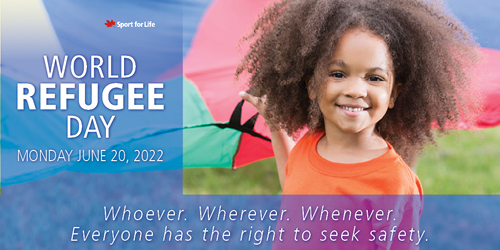Sport for Life Honours World Refugee Day
by Chrissy Colizza
This day is meant to celebrate the strength, courage, and resilience of all the individuals forced to flee their homes, families, and ways of life to escape conflict or persecution. This honouring is always relevant with refugees historically and currently fleeing to Canada. Examples include the Cambodian genocide 1975-1979, the Syrian civil war starting in 2011, the Libyan war beginning in 2018 and the war between Ukraine and Russia starting in 2022.

According to Virginie Ann from the Canadian Press, hundreds of Ukrainians relocated their lives to Canada in the past few months [1]. She explained that while some refugees were warmly welcomed by their friends and family, others were left with overwhelming feelings of confusion and trauma as they entered a new country with no idea of what to expect. After speaking with some of the newcomers, Ann described that some of the refugees were thankful to escape the war but emphasized that this is still a tragedy that has left them feeling traumatized [1].
World Refugee Day shines a light on refugees’ rights, needs, and dreams, helping to mobilize
political will and resources so refugees can survive and thrive. Here at Sport for Life, we advocate for the development of quality sport and physical literacy skills as a means and context for refugees’ social inclusion and well-being as they navigate the tumultuous journey into their new lives. We strive to create a welcoming and inclusive environment for people of refugee status, and implementing a Long-Term Development in Sport and Physical Activity framework will help ensure everyone gets an opportunity to both participate and excel [2].
Quality sport has been shown to play a substantial role in fostering a sense of community belonging and inclusion, and is especially important for refugees to allow them to integrate with each other and their host communities [3]. Therefore, community sport organizations must actively develop programs that foster inclusive sports systems conducive to social integration [3]. To do so, researchers have found three significant areas of impact:
- good coaching that facilitates integration,
- safe, enjoyable and welcoming environments, and
- a focus on fun and social interaction rather than just sporting skills.
In addition to helping refugees transition into their new lives, these efforts will also help reduce stress and trauma symptoms since quality sport and physical literacy improves self-esteem while re-establishing a sense of structure [4]. At Sport for Life, we’re committed to creating a quality sport and physical literacy system that stands #WithRefugees – whoever they are, wherever they come from, and wherever they are forced to flee.
Here are some resources, in no particular order, that can support learning more about the role of quality sport and physical literacy in the lives of Canadian refugees and the importance of humane treatment as we work our way towards a more inclusive sport system and society.
- World Refugee Day 2022 Messaging
- Sport for Life for ALL NEWCOMERS TO CANADA: Creating Inclusion of Newcomers in Sport and Physical Activity
- Welcome to Canada: Engaging Newcomers in Sport and Physical Activity
- ‘Active integration’: Sport clubs taking an active role in the integration of refugees
